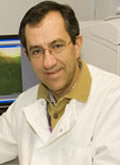Submitted by Administrator on Thu, 07/11/2019 - 16:35
 Researchers from the CRUK Cambridge Centre, including Carlos Caldas (Department of Oncology), Stephen-John Sammut and Suet-Feung Chin (both CRUK Cambridge Institute), working with scientists from the Translational Genomics Research Institute in the US, have developed a personalised blood test to detect fragments of circulating tumour DNA in patients with early stage breast cancer. Published in Science Translational Medicine, this new technique, called TARDIS (TARgeted DIgitial Sequencing), is up to 100 times more sensitive than other blood tests. This test could one day allow doctors to use blood samples to continuously monitor how well breast cancer treatments are working – allowing them to personalise each patient’s treatment plan.
Researchers from the CRUK Cambridge Centre, including Carlos Caldas (Department of Oncology), Stephen-John Sammut and Suet-Feung Chin (both CRUK Cambridge Institute), working with scientists from the Translational Genomics Research Institute in the US, have developed a personalised blood test to detect fragments of circulating tumour DNA in patients with early stage breast cancer. Published in Science Translational Medicine, this new technique, called TARDIS (TARgeted DIgitial Sequencing), is up to 100 times more sensitive than other blood tests. This test could one day allow doctors to use blood samples to continuously monitor how well breast cancer treatments are working – allowing them to personalise each patient’s treatment plan.
Carlos Caldas (Director of CRUK Cambridge Centre Breast Cancer Programme) said: “This could be a game-changer. Instead of patients undergoing six to eight cycles of chemotherapy (15-21 weeks of treatment), after one or two cycles (3-6 weeks) we would use the TARDIS test to look for a significant drop in circulating tumour DNA. If a drop was not detected, the treatment could be stopped or changed.”
